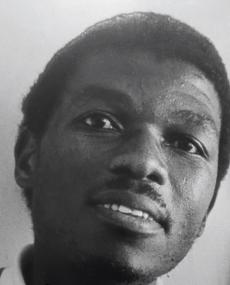
Sam Tambane was born in the village of Tshiozwi Ha-Sinthumele in Venda on 23 August 1953. Sam was the first child of Kutama Fridah Tambani and Nkhumeleni Jack Tambani. He enrolled at Mukhudura Junior Primary School and later went on to enroll at Sinthumele Secondary School in Venda, an apartheid era ‘self-governing’ bantustan in modern day Limpopo. In 1969, Sam passed his grade 8 and left school at an early age due to financial circumstances.
In 1970, Tambani started working at Mangovheli Supermarket and Furniture, delivering furniture. He continued to work up until he was employed by Gundelfinfer in 1972, where he worked for seven years. In 1979, he was employed at Anglo American Corporation as a security guard. He was then promoted to work as a purchasing clerk.
In 1979, Sam become involved in the Black Workers Union (BAWU), a predecessor of the General and Workers Union (GAWU). In 1980, he became the member of GAWU and within the four years, he was elected as a National Executive Committee member until the termination of GAWU in 1987. While working as a GAWU Executive Committee member, he represented the union as its permanent delegate in the Transvaal United Democratic Movement (UDF). Sam also participated in the formation of UDF by helping to set up branches in Soweto.
Sam started to be active in civic matters, after he was nominated as one of the union’s representatives in the Anti- Community Council Committee (ACCC). In 1982, Sam was recruited into the underground structures of the South African Communist Party (CPSA). In the mid 80’s, he served in the underground structures of the South African Congress of Trade Unions (SACTU) and the African National Congress (ANC). In 1992, he was deployed as a secretary of the ANC Soweto sub-region. Sam was also instrumental in the formation of the Congress of South African Trade Unions (COSATU) in 1985. He was also known as the popular leader of COSATU, ANC and SACP in the then Witwatersrand region.
In addition, Sam became a member of the National Union of Mineworkers (NUM) in 1986.He also became the chairperson of the National Educational Sub-Committee (NESCO). Sam, as an education activist, was interested in upgrading the educational level of the miners. He believed in proper leadership and the training of future leaders. Sam introduced the Education Blitz campaign with the aim of presenting detailed knowledge to senior shaft stewards within a month. He gave them intensive training on trade union work.
Unfortunately, on 14 April 1993 Sam Tambani was killed by apartheid police at Protea Police Station in Soweto. He was shot by the Protea policemen among the peaceful crowd that was protesting against the murder of Chris Hani.
In 2012, the National Union of Mineworkers (NUM) and the Mineworkers Investment established a research institute in remembrance of Sam Tambani’s role and to undertake research on workers issues which they named Sam Tambani Research Institute (SATRI).
The information for this biography was kindly provided by Magera Doctor Katangana of the Sam Tambani Institute